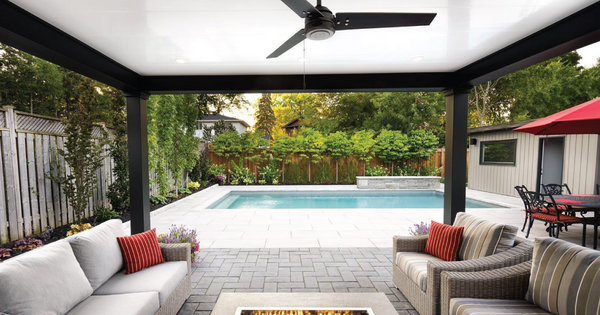In the world of home improvement, the carport often plays second fiddle to the main house. While we invest time and effort in beautifying the exterior of our homes, carport ceilings often remain neglected. It’s time to change that. In this blog post, we dive into the realm of carport ceiling ideas to help you fortify your carport against the elements.
Benefits of Covering and Weatherproofing Your Carport
Let's start by unraveling the incredible benefits of weatherproofing your carport ceiling. It's not just about aesthetics – it's about safeguarding assets like your car from Mother Nature's unpredictability.
- Protection from the Elements: Imagine a relentless downpour – without proper protection, your carport ceiling is like an open invitation to raindrops. Weatherproofing shields your carport from rain, preventing it from turning into a waterlogged disaster zone.
- Guard Against Snow: Anyone living in snow-prone regions knows how frustrating it is to dig your vehicle out from under a heavy snowfall. With a covered carport, you won’t have to spend any time clearing away ice and snow – you’ll always be ready to hit the road.
- Block Out Unnecessary UV Rays: The sun can be brutal to your car's paint job. UV rays can cause fading and cracking, rendering your once-gleaming vehicle a shadow of its former self. Weatherproofing acts as a powerful sunblock, preserving your car's appearance and value.
- Get Extra Defense Against Debris: Fallen leaves, twigs, and other debris can accumulate on your carport ceiling. Over time, this buildup can be unsightly and pose a threat to your vehicles. A weatherproof ceiling keeps this mess at bay, ensuring your carport remains a clean and protected space.
- Extend the Lifespan of Your Carport: Beyond the immediate benefits, weatherproofing enhances the durability of your carport. By preventing water damage and structural decay, it extends the lifespan of the entire structure. That means fewer costly repairs down the road.
3 Popular Carport Ceiling Material Options
Now that we've established the importance of weatherproofing, let's explore three popular carport ceiling materials: Wood, metal, and PVC panels. Each option comes with its own set of characteristics, and choosing the right one depends on your specific needs, preferences, and desired carport ceiling design.
Wood Panels
Wood panels for carport ceilings offer a traditional, natural aesthetic but have varying levels of durability depending on the wood species used. While finished wood panels often act as an aesthetic extension of your home, you’ll likely experience performance issues over time.
- Durability: Wood panels are generally less durable than metal or PVC and are prone to rot and insect damage over time.
- Water Resistance: Wood panels are highly susceptible to water damage and may rot or warp when exposed to moisture, and wood requires sealant and maintenance to protect against moisture.
- Ease of Install: Wood panels can be challenging to install because they require precise cutting and fastening.
- Cleanability: Wood panels can be cleaned with scrub brushes, mild detergent, and a lot of elbow grease, but you need to be careful not to use too much water to avoid future swelling and warping. Pressure or power washers can also be used but present the same water risk.
- Aesthetics: Wood panels provide a natural, rustic appeal, but their appearance can change over time due to aging and weathering.
- Cost: Wood panels typically have lower upfront costs but can incur higher maintenance and replacement expenses over time.

Metal Panels
Metal carport ceiling panels are available in aluminum, steel, and prefabricated insulated polystyrene panels, which are covered in either aluminum or steel. These panels are known for being durable and sturdy, but they may not be quite the aesthetic you’re looking for.
- Durability: Metal panels are known for their toughness and long lifespan. However, some thin metal sheets can be pliable, making them susceptible to dents. Corrugated or ribbed metal panels offer improved strength and durability, though at a higher cost.
- Water Resistance: Metal panels can withstand moisture better than wood but can corrode or rust over time if not properly treated.
- Ease of Install: Thin metal panels may be challenging for one person to handle due to their lack of rigidity. Thicker sheets, while more manageable, can be heavy and difficult to cut.
- Cleanability: Some metal panels have smooth, painted coatings that are super easy to clean, while others with rougher surfaces are more challenging to maintain.
- Aesthetics: Metal panels come in various finishes and colors, offering both an industrial look and a more modern aesthetic.
- Cost: Metal panels' price depends on type, quality, and thickness. While choosing thinner or lower-quality metal panels may save you money upfront, it can also lead to reduced job quality and increased long-term maintenance costs.

PVC Panels
PVC-based panels like Trusscore Wall&CeilingBoard are primarily used in interior spaces, but it’s also well suited for sheltered exterior ceilings like carports. The pre-finished panels are available in white and gray, and they offer superior performance over alternative materials.
- Durability: Once they’re installed on your carport ceiling, you never have to worry about Trusscore Wall&CeilingBoard panels being damaged. The panels are scratch, dent, and impact resistant, and the mechanical strength of PVC means they’ll likely outlive the carport structure itself.
- Water Resistance: Trusscore Wall&CeilingBoard panels are 100% resistant to water and moisture, meaning exposure to rain and humidity won’t affect them. Plus, when silicone sealant is applied to the tongue and groove seam of each panel during installation, you can ensure a water-resistant surface across all panels regardless of which direction water or moisture is coming from.
- Ease of Install: Trusscore Wall&CeilingBoard panels are lightweight, easy to install, and only takes one person to install them overhead. Plus, there are no specialized skills or tools needed for installation, making it an ideal choice for DIYers.
- Cleanability: Thanks to its smooth, non-porous surface, Trusscore Wall&CeilingBoard can be easily and repeatedly cleaned with soap and water. For stubborn dirt, you can even go ahead and grab your pressure washer — with a quick spray, your ceiling will shine like the day the panels were installed.
- Aesthetics: Trusscore offers a modern and minimalist finish to your carport ceiling and is highly reflective, so it’ll maximize any natural or fixture lighting in the area. If you’re in and out of your vehicle a lot after dark, you’ll have a well-lit area to walk through before heading inside.
- Cost: PVC panels like Trusscore are designed to never have to be repaired or replaced. While they may have a slightly higher upfront cost compared to some metal or wood options, their durability and low maintenance can offset these costs in the long run.
Find a Retailer
Trusscore works with thousands of retailers across North America to bring you the best service and access to our products.
DIY vs. Professional Installation
As you embark on your carport ceiling project, you'll need to decide whether to take the DIY route or enlist professional help. Each path has its advantages and disadvantages.
DIY Installation
- Pros: Potential cost savings – you'll only need to invest in materials and your time.
- Cons: Requires a substantial amount of time and effort, and there's a risk of making mistakes that could lead to costly repairs later.
If you're leaning towards the DIY approach, here are some safety precautions to keep in mind:
- Always adhere to the manufacturer's instructions for the materials and tools you're using.
- Wear appropriate safety gear, including gloves, safety glasses, and a dust mask.
- Consider working with a partner for added safety, especially when handling large panels or heavy materials.
Professional Installation
- Pros: Expertise and experience ensure a high-quality result. It saves you time and spares you from the headache of figuring it out on your own.
- Cons: It comes at a higher cost, as you'll need to pay for labor and materials. Only consider the DIY approach if you're confident in your skills and have the necessary tools. To save money, shop around for materials and compare prices at local home improvement stores or online suppliers.
- Only consider the DIY approach if you're confident in your skills and have the necessary tools. To save money, shop around for materials and compare prices at local home improvement stores or online suppliers.
How to Maintain Your Carport Ceiling
Once your carport ceiling is in place, maintaining and caring for it becomes essential to ensure its longevity and performance. Let's break down the steps in detail:
- Cleaning: Regular cleaning is crucial to prevent the buildup of dirt, debris, and leaves on the ceiling surface. Use a broom or leaf blower to remove loose debris. Wash the ceiling with a mild detergent and a soft brush or sponge. Rinse thoroughly with a hose, ensuring all cleaning residue is removed.
- Inspecting: Regular inspections help you catch issues early, preventing costly repairs down the line. Check for cracks, holes, or signs of water damage. Inspect the insulation for any damage.
- Replacing or Repairing: Address any issues promptly to prevent further damage. For example, patch up any cracks or holes with appropriate sealants or patch kits, replace damaged or worn-out insulation materials, and clean or replace ventilation filters as needed.
Your carport is more than just a shelter for your vehicles – it's an integral part of your home. Weatherproofing its ceiling is a practical investment that protects your valuable assets and extends the lifespan of the entire structure. Whether you choose wood, metal, or PVC panels, implement proper insulation and ventilation, and decide between DIY or professional installation, it all boils down to simplifying complexity to create a weatherproof space that serves you well. So, take these steps to heart, and weatherproof your carport today. Your vehicles and belongings will thank you for it.


![6 Best Drywall Alternatives for Garage Walls [2026 Cost & Install Guide]](/content/images/cache/blog/best-alternatives-to-drywall-for-garage-walls-refresh/best-alternatives-to-drywall-for-garage-walls-refresh-social.45933b7d.jpg)




